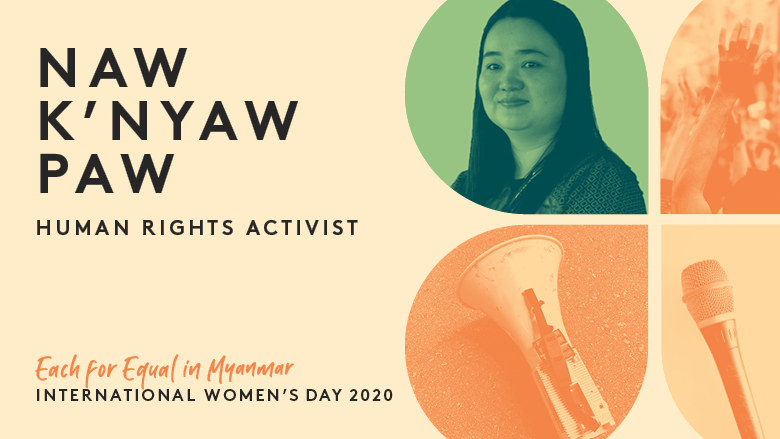Tell us about yourself.
“My name is Naw K’nyaw Paw and I am a human rights and women’s rights activist. I was born and raised on the Thai-Burma [Myanmar*] border after being displaced by the conflict in Karen State. I became a refugee at age 11 after the Burma Army attacked our village.
Since 2013 I am the General Secretary at the Karen Women’s Organization, a feminist, indigenous rights Community Based Organization founded in 1949 that plays a leadership role in the struggle to bring democracy and human rights to Burma. With 70,000 members, KWO amplifies the voices of women in the peace process by advocating for community involvement and ownership in development and decision-making processes. We focus on capacity building, increasing and strengthening women’s voices and influence, as well as providing education and health services to women and children.
As General Secretary I lead implementation of all our programs and activities, following policies and goals set by the KWO Congress, which meets every 4 years. I joined KWO in 1999 after completing my education in Mae Ra Moe refugee camp in Thailand, and held numerous positions: I was the Coordinator of the Human Rights and Democracy (Youth) Education program; I worked as a Women’s Rights and Leadership Trainer, focusing on training grassroots community members; As an Advocacy Team Leader, I represented Karen people at local and international conferences and meetings, and; I also worked as the KWO Emerging Leaders School and Education Program Coordinator.
I have traveled, together with Women’s League of Burma representatives and other activists from Burma, to Geneva and New York attending the UN Human Rights Council, the Commission on the Status of Women (CSW) and the UN Permanent Forum on Indigenous Issues (UNPFII). At all these important forums, I raised human rights issues in our community as well as women’s, indigenous and refugee issues. Last year I received the International Women of Courage award from the US government.”
What inspires you?
“I am inspired by other women activists and women leaders who have committed themselves to support their communities. I am also inspired by my own community I work with and gain strength from their resilience and persistence.”
How do you see Women Breaking Barriers? What does that mean to you?
When women are empowered, they can offer training and break any barriers they are faced with. This means that they have the confidence to speak out, lead and manage their own issues. They can speak for themselves and raise their own issues.
Do you have a favourite quote or saying?
Yes. “Women can, Women do!”
Where do you see Myanmar and women in 25 years?
I envision more women at the government level with laws that guarantee women’s protection and rights. I see more feminists and women as agents of change, where they are recognized as leaders, and not perceived as weak. I also see spaces where they are free to express themselves safely and independently.
What Do you Think is needed in Myanmar for more equality between men and women?
As a grassroots women activist and feminist, I think we need to tackle the root causes of oppression and work through all levels to change laws and policies that disempower women. At the grassroots level, we need to challenge patriarchal systems, dismantle stereotypes and support grassroots women’s leadership. At the policy level, there is a need for reforms to the law and a great need for affirmative action for women.
If you could use one word to describe women in Myanmar what would it be?
Strong!
What is your big hope for women in Myanmar in the future?
My big hope for women from all different backgrounds in Burma is to come together and fight for their rights, to demand respect and have equality. Women regularly stand up and speak for themselves in everyday life and in civil society forums. Women must continue to participate in leadership opportunities across our community and systems of governance.
That’s my hope and I work every day trying to make that happen.
*Editor’s Note: Naw K’nyaw Paw wishes to use the former name of Myanmar, Burma.
**The views expressed in this article do not necessarily represent the views of the World Bank Group and its employees.


